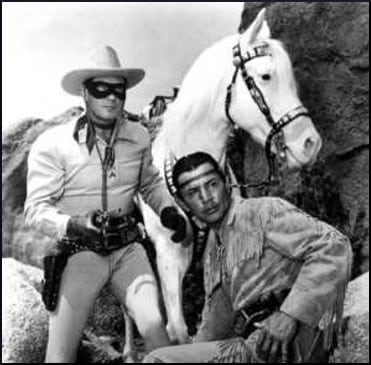
From 1949 to 1957, a TV series called “The Lone Ranger” chronicled the fictional adventures of a crime-fighting cowboy and his Native American sidekick, Tonto. They inspired many versions of a basic joke, of which this is one example:
The Lone Ranger and Tonto are surrounded by hundreds of hostile Indians.
The Lone Ranger says, “Well, Tonto old friend, it looks like we’re done for.”
Tonto replies, “Who is ‘we,’ white man?”
The trope became entrenched in America’s lexicon and imagination. According to pop culture historian Brian Cronin:
It has become very popular in recent years as a rhetorical device for essay writers who wish to write about situations where someone takes for granted that someone is his/her ally.
There is an entity who does this all over the world — who preemptively commandeers a person into “we”-ness without consent. The creature is the Addiction Monster, who apparently lives inside almost everybody, lodging in the oldest part of the brain. That is the connection to obesity — more specifically, to obesity that stems from addiction to eating.
Since all addictions are basically the same, parallels drawn from the world of alcoholism fit here too. Childhood Obesity News previously mentioned the first drinking experience of comedian Jayson Thibault, who heard a voice say, “This is who we are.” Explaining the seemingly multiple personality, Thibault said, “It’s me and this disease, this other thing, that addicts just naturally live with all the time.”
We have also quoted another recovering alcoholic, John McC, also known as A. Orange, who is very familiar with the relentless voice that will rationalize, cajole, or nag, in the attempt to persuade, seduce, and outwit a person into having a cocktail (or a slab of chocolate-covered bacon.) He writes:
Old lizard brain will scream at you, and order you to eat, smoke, drug, or drink… It doesn’t even understand anything like morality, or that it might be wrong to lie to you. All it knows is that it wants a drink or a smoke, or dope, or sex, or food, or something… And it will say or do anything to get it.
Note how the Addiction Monster often uses the word “WE” as in, “We should just have a little one.”… Who is “we”?
John McC describes how the lizard brain often functions as a separate being that relates to the higher brain with strained politeness. Cooperation is needed from the smart, civilized part of us, to drive to the liquor store or ice cream shop and get hold of some addictor. Philosophically, the base brain has little tolerance for us, and would actually prefer autonomy.
The lizard brain can’t sue for divorce, but why does it so badly want to? If a person has only the minimal life functions provided by the base brain, she or he is in a hospital bed. In those circumstances, not many hedonic desires are likely to be indulged. But the base brain is too stupid to realize that.
On the other hand, it is smart enough to recognize how easily it can be vetoed and rejected by the higher brain. John McC suggests that the Addiction Monster can be not only outwitted but out-waited. Once you assert dominance over the addictive voice, it starts to weaken. The longer you resist, he says, the easier it gets:
Fortunately for you, the higher you who is reading this, you are more powerful and more intelligent than base brain. You can over-rule base brain, and make it obey your orders. You can dispute the addictive voice that is alternately begging you and ordering you to drink or smoke or take drugs.
You are not powerless over alcohol, or your addictions, or any of that stuff.
And that goes for food and eating addictions, too. Success has a lot to do with learning to identify the sneaky, undermining voice in order to challenge it: “Who is ‘we,’ Addiction Monster?”
Reactions?
Source: “Comic Book Legends Revealed #329,” Comicbookresources.com, 08/26/11
Source: “The Lizard Brain Addiction Monster,” orange-papers.org, undated
Photo credit: sheldonschwartz via Visualhunt/CC BY-SA

 FAQs and Media Requests:
FAQs and Media Requests: 











